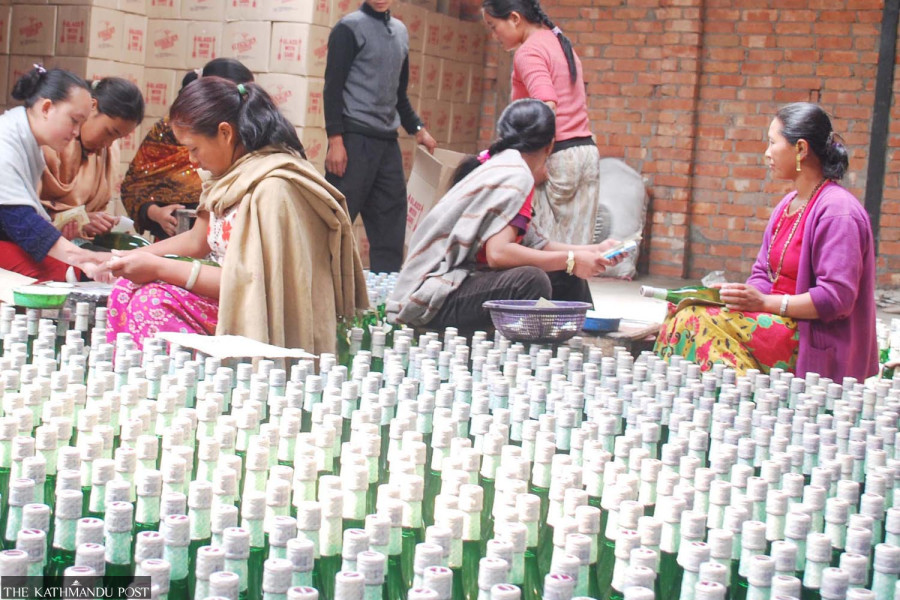Money
Government introduces policy to boost MCSEs
The new policy prioritises utilising knowledge and skills from returnee migrant workers.
Post Report
Micro, cottage and small industries (MCSEs) are the foundation of the local economy as they help increase per capita income, create jobs, and provide income opportunities for the low- and medium-bracket population.
The government has implemented a new policy to increase their contribution to the national economy and make them competitive.
The Cabinet meeting on December 13 approved the policy.
As per the policy, an entrepreneur-oriented environment will be created to boost production along its value chain.
“Coordination among federal, provincial and local governments will be made for developing and promoting micro, cottage and small-scale industries,” the policy document says.
The policy also includes mainstreaming marginalised communities and the area. To promote an entrepreneurial culture, improvements in the educational system will be made to produce industrial manpower, according to the policy.
“At a time when MCSEs are struggling to remain afloat after being hit by the Covid-19 pandemic, the policy is expected to boost their morale,” said Narendra Kumar Khadka, chairperson of the cottage and small industry committee at the Federation of Nepalese Chambers of Commerce and Industry.
“However, effective policy implementation is questionable due to frequent changes in government.”
But for now, at least, the policy has come, said Khadka. “We are hopeful.”
The policy also includes increasing the export of goods produced by MCSEs and talks about strengthening the traditional handicraft industry and making it export-oriented.
Khadka said that the policy was introduced after discussing it with the stakeholders.
Private sector leaders say the development of MCSEs depends on the political situation.
Experts say there are many challenges: the country’s economy is crawling, business confidence is low, the cost of operating the industry is staggeringly high, and India is imposing export restrictions.
“Almost all raw materials for domestic industries need to be imported from India or China or from third countries. MCSEs suffer due to an unfriendly customs regime and high taxes,” said Khadka.
According to the policy, to link MCSEs in the value chain, a forward and backward linkage with medium and large-scale industries will be created.
The policy highlighted that MCSEs currently face weak infrastructure, a lack of skilled manpower, incapacity to adopt modern technology and restrictions on accessing market and finance.
Similarly, there is a lack of effective coordination between federal, provincial and local levels.
Different MCSE policies and delays in implementing industrial and investment promotion funds are setbacks for business promotion.
Easing the industry registration process, making enterprise advice services and technology available, providing training, and subsidising loans are the few suggestions the policy has mentioned to boost MCSEs.
A report entitled Small and Medium-Sized Enterprise Monitor, published by the Asian Development Bank in December 2021, says 33.1 percent of MCSEs use inheritance wealth or ancestral properties while 25.8 percent use income and savings for initial financing for their business.
About 85 percent of workers in Nepal are informal. Most MCSEs are engaged in services and operate in rural areas; only a few cater to international markets, although their impact on exports varies by the country.
Access to bank credit remains limited for MCSEs, with just 16 percent going to banks and financial institutions.
The Micro, Small, and Medium-sized Enterprises’ Access to Finance in Nepal report, released by the United Nations Economic and Social Commission for Asia and the Pacific in 2020, states that MCSEs contribute 22 percent to Nepal's GDP.
According to the Central Bureau of Statistics, almost half of all business establishments are unregistered, and more than 90 percent of workers in MCSEs with fewer than 10 employees have informal employee relationships.
The National Economic Census 2018 shows that 923,356 establishments were operating in Nepal, and around a half were registered.
The MCSEs sector—which includes 69.3 percent micro-enterprises, 25.2 percent small enterprises, and 5.5 percent medium-sized enterprises—employs 2.74 million people.
To boost Nepal’s development, the importance of businesses as primary contributors to growth cannot be overstated. For businesses to reach their full potential and contribute to overall national economic growth, experts say ensuring an enabling environment for them to prosper is fundamental.
The new policy prioritises utilising knowledge and skills from returnee migrant workers.
“To implement policy, equal support from all three tiers of government, private sector, development partners, and aid agencies are needed,” the policy reads.
The Micro, Cottage and Small Scale Industry Promotion Centre will be the main agent responsible for implementing the policy. The Ministry of Industry, Commerce and Supplies will support and facilitate the centre for policy implementation.




 9.89°C Kathmandu
9.89°C Kathmandu














